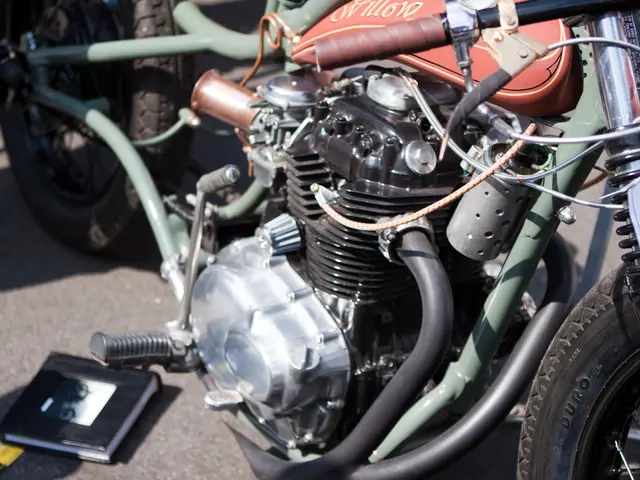Jammin' With the Second Gen Tiguan: A Better Ride for a Better Price
The Redesigned Second-Gen Volkswagen Tiguan Showcases Improvements
The VW Tiguan, a fan favorite in the brand's roster, has got a solid spot in the used car market, and with the second generation (2016-2023) reigning supreme, here's what you should know before diving in.
The Tiguan has been a leading force in Volkswagen's bestsellers since its debut in 2007. The second generation didn’t disappoint, maintaining its popularity. However, being a savvy shopper means being aware of potential pitfalls.
Quality Control
The second gen Tiguan has made a good impression in its three primary evaluated TÜV main inspections. Unlike its first generation, the compact SUV usually cruises through the chassis inspection without a hitch. The lighting system and checks on the environmental aspects (exhaust system and oil loss) rarely pose problems. Occasionally, oil loss might rear its head, but it’s nothing extraordinary. The TÜV inspectors are, however, prone to criticize worn brake discs.
Size Matters
Compared to its predecessor, the five-seater SUV grew by 6 centimeters to 4.49 meters. The space is decent in both rows. The trunk volume varies between 600 and 1,655 liters depending on the position of the rear bench, which can slide back and forth by 18 centimeters, and the position of the rear seat backrest.
The Allspace version, stretching to 4.70 meters, offers up to seven seats; with different seat configurations, the trunk volume ranges between 760 to 1,920 liters (five-seater) and 230 to 1,775 liters (seven-seater). Powered by the Volkswagen Group's MQB modular transverse matrix technology, the Tiguan II boasts a well-deserved pedigree.
Autumn 2020 and 2021 saw the Tiguan and its Allspace sibling get a facelift, characterized by a Face ID-inspired front with more chrome, changed headlights, and a few other tweaks.
Power Under the Hood
Initially, the gasoline engines included a 1.4-liter four-cylinder with 92 kW/125 PS and 110 kW/150 PS, alongside a 2.0-liter with 132 kW/180 PS and 162 kW/220 PS. All-wheel drive was standard for these engines, and the 150-PS engine's all-wheel drive could be optionally ordered.
In 2018, the gasoline engines underwent a revamp as part of the Euro 6d emission regulations transition. The entry-level engine then became a 1.5-liter four-cylinder with 96 kW/130 PS and 110 kW/150 PS. The top 2.0-liter engine saw a slight power boost to 169 kW/230 PS. With the facelift, Volkswagen expanded its engine range to include a plug-in hybrid with a system output of 180 kW/245 PS and a new top version, the Tiguan R, with 235 kW/320 PS.
The diesel engines were initially a 2.0-liter with 85 kW/115 PS, followed by further output stages of 110 kW/150 PS, 140 kW/190 PS, and 176 kW/240 PS. All engines except the 115-PS engine were optionally (150 PS) or standard (190 and 240 PS) equipped with all-wheel drive. Post-facelift, Volkswagen condensed its diesel range to include a 90 kW/122 PS, 110 kW/150 PS, and 147 kW/200 PS engine.
A Little Extra
Initially, the compact SUV was offered in the familiar comfort levels "Trendline", "Highline", and "Comfortline". However, after the facelift, they were renamed "Tiguan", "Life", "Elegance", and "R-Line". Apart from these lines, first-time buyers had the option to customize their Tiguan with additional features, such as a virtual cockpit or a trailer maneuvering assistant, for an extra cost. Post-facelift, the new infotainment generation based on the Modular Infotainment Matrix (MIB3) and an extended assistance system became available.
In conclusion, the second-generation Tiguan has proven itself worthy of its popularity within the VW lineup, boasting an understated design, a well-executed interior space concept, and a diverse engine range. With a hefty 8,000 used Tiguan II models available on mobile.de for a starting price of around 11,000 euros, you can get your hands on a quality pre-owned compact SUV.
Remember, every Bentley started as a beat-up Rolls-Royce! 😉
Know your Tiguan: Some common issues to stay away from include excessive engine oil consumption (due to a class action lawsuit), transmission and gearbox concerns, electronics and infotainment system glitches, interior and exterior wear, potential safety feature malfunctions, and hidden maintenance History. A test drive, mechanic inspection, and thorough examination of the vehicle's condition are crucial before making your purchase. Happy hunting!
Sources: ntv.de, Holger Holzer/sp-x, auto.floor.de, Volkswagen
- Volkswagen Models
- Used Cars
- Other vehicles of heading 8703, such as the second gen Tiguan, can improve your lifestyle with their diverse technology, including gadgets like a virtual cockpit and trailer maneuvering assistant.
- Choosing an electric-vehicle like the Tiguan, combined with car-maintenance best practices, can contribute to a more environmentally-friendly lifestyle.
- The Tiguan's vast engine range, which includes options like gasoline, diesel, and hybrid, caters to various preferences, making it a versatile choice for those looking for a car that suits their technical needs and budget.








